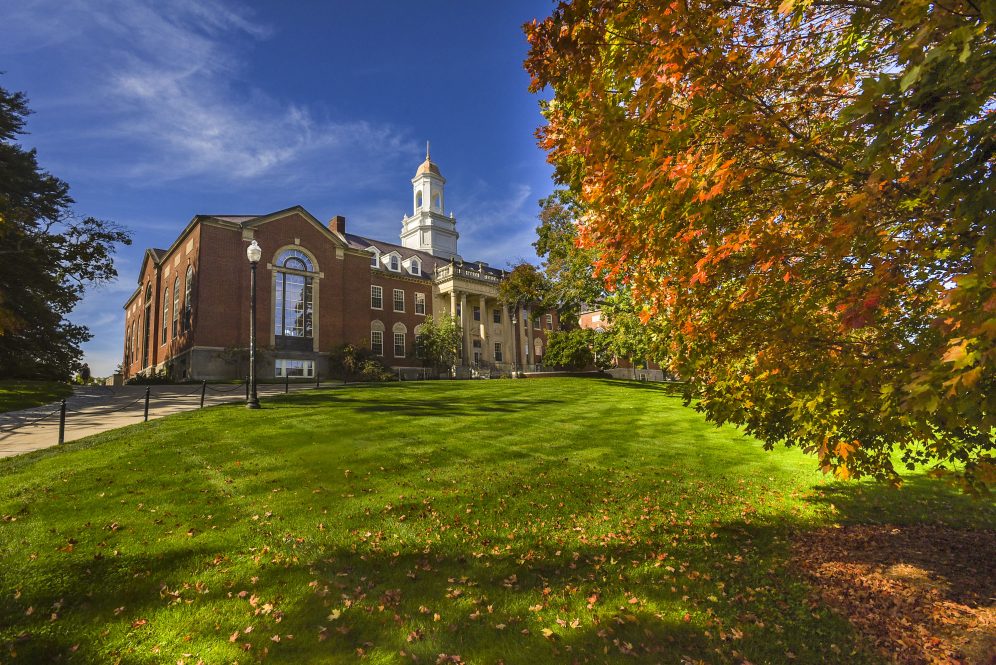Each year, the Provost’s Awards for Excellence in Community-Engaged Scholarship (PAECES) recognize the outstanding contributions of faculty, staff, students, teams, and community partners who collaboratively address critical societal challenges through the creative and reciprocal exchange of knowledge and resources.
As a cornerstone of a land-grant university’s mission, Community-Engaged Scholarship enriches research, teaching, and learning; fosters inclusive and transformative educational experiences; prepares engaged citizens; and promotes social justice, civic responsibility, and the public good.
We are proud to honor those who exemplify these values. Please join us in congratulating the 2025 PAECES award recipients:
COMMUNITY PARTNER CATEGORY
- Community Partner Award: Hartbeat Ensemble
FACULTY CATEGORY
- Faculty Community Impact
- Distinguished Faculty Community Impact Award: Laura Cisneros
- Emerging Faculty Community Impact Award: Cristina Colon-Semenza
- Faculty Instruction
- Distinguished Faculty Instructor Award: Jon Bauer
- Emerging Faculty Instructor Award: William Davenport
- Faculty Research
- Distinguished Faculty Research Award: George Plesko
- Emerging Faculty Research Award: Peter Chen
- FacultyTeam
- Faculty Team Award: Native American and Indigenous Studies
INSTITUTIONAL TRANSFORMATION CATEGORY
- Institutional Transformation Award: Orthopedic Surgery
STAFF CATEGORY
- Distinguished Staff Award: Milagros Marrero-Johnson
- Emerging Staff Award: Tanya Johnson
- Staff Team Award: UConn Husky Nutrition & Sport
STUDENT CATEGORY
- Graduate Student Award: Kamal Gautam
- Undergraduate Student Award: Sydney Seldon
- Student Team Award: Aviral Mehta, Pratham Tallam, Faizdeenkhan Pathan
Community Partner Award: Hartbeat Ensemble
Founded in 2001, HartBeat Ensemble creates a theater that bridges the divide of race, gender, class, and geography. Led by artist-activists, HartBeat develops and presents original, socially conscious productions inspired by critical civic issues. Their performances invite audiences into transformative experiences, often followed by guided community conversations. HartBeat nurtures the next generation of change-makers through its Youth Play Institute, providing young people with meaningful training and leadership opportunities that integrate the arts into civic life.
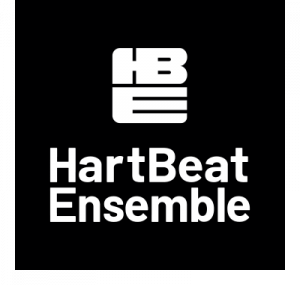
Artistic Director Godfrey Simmons, Jr. facilitated the partnership between HartBeat Ensemble and the University of Connecticut, hired in 2019 as an adjunct professor to teach an introductory acting class at the University’s regional campus in Hartford. Simmons also served as the program’s diversity and inclusion specialist and began working with the Human Rights Institute through their Democracy & Dialogues Initiative in October 2020. He brought HartBeat Ensemble to UConn for the first time in the spring of 2021 to perform their original play, Stuck in the Tape, at the annual Anti-Racism, Education, and Community Symposium at UConn Hartford. HartBeat Ensemble, led by Godfrey Simmons, Jeanika Browne-Springer, and Rhoda Cerritelli, has actively partnered with various UConn programs and colleges, including the Center for Excellence in Teaching and Learning (CETL) and the College of Agriculture, Health, and Natural Resources (CAHNR). HartBeat Ensemble has also collaborated closely with Professor Jason Chang, creating internship opportunities for students at the HartBeat Ensemble’s Youth Play Institute.
HartBeat Ensemble has significantly impacted the UConn community by generating engagement from students, faculty, staff, and administrators on issues affecting them and society. Their original play, Stuck in the Tape, based on UConn students’ experiences, has fostered critical thinking, social awareness, and empathy among participants. HartBeat’s initiative led to workshops in 2024 to collaboratively author a diversity, equity, inclusion, and justice statement for CAHNR. They also partnered with Hartford Healthcare to train actors for the OBGYN department through the Center for Education, Simulation, and Innovation (CESI), enhancing communication skills through interactive scenarios.
HartBeat is part of a National Endowment for the Arts Our Town grant from UConn Hartford. This grant will allow HartBeat to create and perform Story Circles throughout Hartford, accessible to as many neighborhoods as possible. HartBeat Ensemble is a hub for contemporary, inclusive artmaking, supporting Connecticut artists and beyond through shared space, innovative programming, and a commitment to art as a catalyst for social change. The HartBeat Ensemble exemplifies a true transformative community partner.
Distinguished Faculty Community Impact Award: Laura Cisneros
Laura Cisneros, associate extension professor in the Department of Natural Resources and Environment and the Institute of the Environment and Energy, redefines connecting science with the community. As the director of the Natural Resources Conservation Academy (NRCA), she has transformed this initiative into a powerful series of Extension programs that are scientifically rigorous and deeply rooted in community engagement. Her efforts have supported over 200 environmental action projects across 125 towns, benefiting the people of Connecticut and the ecosystems they call home.
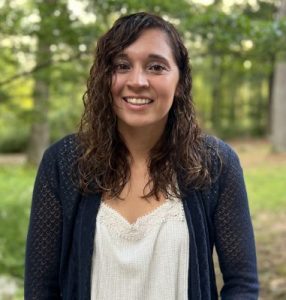
Professor Cisneros empowers communities with the knowledge, skills, and support needed to participate meaningfully in local environmental conservation. She brings her strong academic background in ecology and environmental science to guide and shape the NRCA’s evolving initiatives. But it’s her vision—to make science accessible, inclusive, and impactful—that has truly set her work apart. Her leadership of the NRCA is a model for community-focused STEM education. She has mentored and supported over 570 participants—including teens, teachers, adult volunteers, and undergraduate mentors—through more than 230 community-based environmental projects. These programs teach science, build relationships, foster agency, and inspire long-term engagement with environmental stewardship.
Central to her work are equity-driven strategies: near-peer mentorship, culturally sustaining pedagogy, trauma-informed practices, and authentic community engagement. Professor Cisneros has made it a mission to address inequities in access to STEM education and environmental leadership. Under her guidance, the NRCA has evolved to be more accessible, more comprehensive, and more culturally relevant. These innovations are more than educational opportunities; they are platforms for transformation. These programs change lives. Participants change how they see themselves — as scientists, leaders, and stewards of the environment.
Professor Cisneros’s influence extends well beyond NRCA. She is active in statewide and national initiatives, serving on boards such as the Connecticut Outdoor & Environmental Education Association and the Keney Park Sustainability Project. She organizes large-scale public events, such as the Youth in STEM: Leadership & Changemaker Summits and the Environmental Changemakers Showcase at the Connecticut Science Center, to amplify youth voices and mobilize community action. Professor Cisneros has successfully integrated research and extension, ensuring that the NRCA also contributes to the national conversation on science education, outreach, and equity. Her approach bridges scholarship and practice, enabling research findings to influence programming in real-time while documenting successful models for others to follow.
Professor Laura Cisneros’s work has transformed the landscape of environmental education in Connecticut and beyond. Through intentional design, inclusive practices, and a relentless commitment to the community, she is cultivating a new generation of environmental leaders who reflect our community’s diversity and are equipped to build a more just, resilient, and sustainable future.
Emerging Faculty Community Impact Award: Cristina Colón-Semenza
Cristina Colón-Semenza, assistant professor in the Department of Kinesiology, has been on a mission to create a community that moves, connects, and thrives despite Parkinson’s disease. Professor Colón-Semenza’s dedication to research, education, and service has transformed lives locally and shaped care for people with Parkinson’s disease across the country and worldwide.
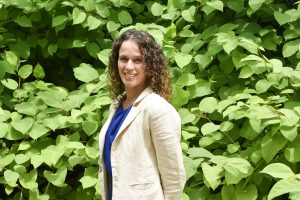
Parkinson’s disease affects over one million people in the United States and more than ten million globally. It’s a progressive, chronic neurodegenerative disorder that impacts movement, mood, thinking, and quality of life. While exercise has been shown to alter the course of the disease significantly, most individuals with Parkinson’s disease do not engage in enough physical activity to experience those benefits. Recognizing this gap, Professor Colón-Semenza created the UConn Parkinson’s disease exercise class, a program designed to support people living with Parkinson’s disease in maintaining the gains they achieved during formal therapy and empower them to stay active long-term.
What began as a small initiative has blossomed into a vibrant community that has impacted approximately 100 individuals living with Parkinson’s disease and their care partners—spouses, children, and grandchildren. The community gathers weekly to exercise and connect. The class targets the impairments most common in Parkinson’s disease and is carefully adapted to meet each participant’s needs. In a recent survey, 100% of participants reported that the class helped them feel more physically active, healthier, and socially connected.
Professor Colón-Semenza’s impact extends to experiential learning opportunity for undergraduate and graduate students at UConn. Over 80 Doctor of Physical Therapy (DPT) students have gained hands-on experience working with people living with Parkinson’s disease, helping them build confidence and skill in treating this population. Undergraduate students form personal connections with participants and learn firsthand about Parkinson’s disease’s physical and emotional realities. Students bring new energy and emerging evidence-based techniques to the class while participants share their experiences, giving students a deeper, more human understanding of life with Parkinson’s disease. As community educators, many participants participate in Dr. Colón-Semenza’s DPT Neurorehabilitation course, helping train the next generation of compassionate and competent clinicians.
Dr. Colón-Semenza’s scholarly work has grown directly from these community relationships. Inspired by the perseverance of her class members, she began researching the impact of social support and physical activity on Parkinson’s disease management. In one study, she found that peer-supported participants increased their high-intensity physical activity by 42%.
She has also turned her attention to a critical gap in care: the Hispanic/Latinx community, which has the highest incidence of Parkinson’s disease yet remains underserved. Through focus groups and a culturally adapted intervention, she has begun to explore how exercise and social support can be better leveraged for this population. These findings have already been presented at national conferences and published in leading journals, with further research funded through the UConn Pepper Scholar Award.
Dr. Colón-Semenza has dedicated her time to community engagement without compensation or teaching credit. Her unwavering commitment has expanded to high school students through the Connecticut College Access Program (ConnCAP) and to Hispanic/Latinx communities nationally and internationally through partnerships with significant non-profits, including the Michael J. Fox Foundation, the Parkinson’s Foundation, the American Parkinson’s Disease Association, and the Davis Phinney Foundation. Her webinars, presented in Spanish, have made evidence-based information about Parkinson’s disease and exercise accessible across the globe.
Dr. Colón-Semenza has created a community-based program that delivers far-reaching, multifaceted impact. It uplifts those with Parkinson’s disease, educates and inspires future healthcare providers, and generates research that reshapes Parkinson’s disease care across cultures and continents. Through her work, she exemplifies the transformative potential of a faculty member committed to community impact, educational innovation, and inclusive research.
Distinguished Faculty Instructor Award: Jon Bauer
Jon Bauer, Clinical Professor of Law, Richard D. Tulisano’69 Scholar in Human Rights, and director of the School of Law’s Asylum and Human Rights Clinic (AHRC), has spent more than two decades championing the rights of individuals fleeing persecution while transforming the lives of the students he mentors.
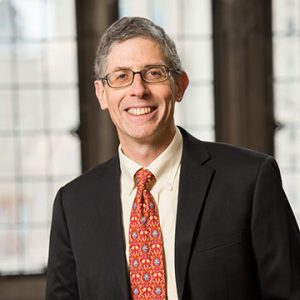
Since co-founding the Clinic in 2002, Professor Bauer has led a rigorous and deeply impactful service-learning program that immerses law students in every aspect of high-stakes asylum representation. Under his guidance, students have handled 185 asylum cases, securing legal protection for their clients in over 90% of the cases, a grant rate more than twice the national average. These victories have enabled more than 300 clients and members of their families from across the globe to rebuild their lives in safety and dignity.
The AHRC offers a 14-credit, year-long clinical experience where students take primary responsibility for client representation, including fact investigation, legal research, brief writing, and appearing at hearings before the Immigration Court or the U.S. Asylum Office. The curriculum weaves rigorous instruction in refugee law with essential practice skills, from oral and written advocacy to trauma-informed and cross-cultural communication.
The AHRC’s cases have addressed cutting-edge legal issues and contributed to landmark decisions advancing the rights of asylum seekers nationwide. Clients represented through the Clinic have fled persecution based on political beliefs, religion, gender, race, ethnicity, and sexual orientation. Many have survived violence, torture, or the threat of death. For these individuals, the AHRC has often been their last hope—and under Bauer’s direction, that hope has turned into real, lasting outcomes.
Professor Bauer’s leadership extends beyond the courtroom. He has pioneered an interdisciplinary approach to legal education by embedding collaboration across UConn’s departments. Medical and psychological evaluations from UConn Health support client claims. A Social Work student is embedded in the AHRC each year, ensuring clients connect with needed resources like housing, medical care, and food. These partnerships model holistic, compassionate representation and teach students to navigate complex, collaborative environments.
From 2016 to 2019, Professor Bauer also co-led week-long spring service trips providing pro bono legal assistance to detained asylum seekers, including families with children, in immigration detention centers in Pennsylvania. The teams included UConn Law students, faculty from the Schools of Law and Social Work, UConn undergraduates, and volunteer attorneys—many of them UConn alumni—who worked intensively with detainees to help them apply for asylum and assemble supporting evidence for their applications. For this work, the AHRC received the “Light of Liberty Award” from the Pennsylvania Immigrant Resource Center, recognizing its outstanding service to vulnerable immigrant communities.
The ripple effects of Bauer’s mentorship are extraordinary. AHRC alumni have served in the U.S. Departments of Justice, State, and Homeland Security, as well as in public interest law, private firms, and judicial clerkships. Ellen Messali ’10, now a legal aid attorney, credits the Clinic with showing her how to practice law “so compassionately, so well, so thoughtfully.” Professor Bauer has mentored a generation of Clinical Teaching Fellows, several of whom have become clinical faculty or deans at law schools nationwide. His impact is felt not only in the students and clients he serves directly but also in legal education.
Beyond the law school, Professor Bauer is an active leader in the community. His advocacy and work on boards spans the Connecticut Fair Housing Center, Connecticut Legal Services, the Hartford Immigration Court’s Pro Bono Committee, and immigrant rights coalitions. He has moderated public forums on immigration, organized a state-wide symposium on trauma-informed justice, and appeared on NPR’s Where We Live to speak about immigrant rights. In 2019, the U.S. Attorney’s Office honored him with its Civil Rights Enforcement Award for decades-long advocacy to eliminate discriminatory mental health inquiries from the bar admissions process.
Professor Bauer exemplifies the transformative power of legal education, which is grounded in justice, compassion, real-world impact, and an unwavering commitment to students, clients, and the greater good.
Emerging Faculty Instructor Award: William Davenport
Bill Davenport ’85 (CLAS),’86 MS, 4-H Youth Development assistant educator in the Department of Extension, serves more than 500 youth nationwide. His strong teaching and curriculum development background has seamlessly translated his classroom skills from his 33 years of experience as a high school agriscience teacher and program director into impactful, real-world programming. (Bill was named the 2004 State Teacher of the Year during his high school teaching career.) Collaborating with over 100 volunteers, Mr. Davenport has built strategic partnerships with schools, farms, civic groups, and local businesses to expand 4-H programming and boost agricultural literacy throughout the county and beyond.
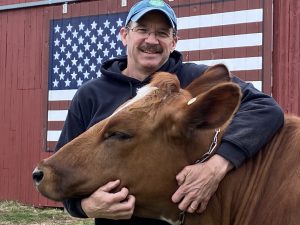
His work includes spearheading initiatives related to farm-to-school education, dairy cattle, civic engagement, and community service. He recruits, trains, manages, and recognizes youth and adult volunteers, fostering a vibrant and engaged 4-H community. He has also secured significant grant funding—over $1 million—through collaborations with colleagues at UConn and local stakeholder organizations, allowing him to launch and sustain impactful programs.
One of his most recognized initiatives is Operation Community Impact, launched in April 2020 in response to food insecurity during the COVID-19 pandemic. What began as a grassroots movement in Litchfield County, mobilizing 4-H families and volunteers to distribute surplus dairy products, has grown into a statewide effort. By partnering with local dairy cooperatives, food pantries, businesses, and civic groups, Mr. Davenport organized the donation and delivery of over 280,000 pounds of dairy products to 96 food pantries across 57 towns, serving more than 10,700 families. His leadership extended to coordinating logistics, securing refrigeration and transport, and involving 4-H youth in meaningful service.
Another standout project is the Tower Garden Outreach Project. This grant-funded initiative brings hydroponic growing systems into third-grade classrooms in towns such as Litchfield, Goshen, Bethlehem, and Torrington. This farm-to-school nutrition program teaches young students how food is grown and why local agriculture matters. It also includes educational field trips to nearby farms. Mr. Davenport collaborated with school districts, horticultural organizations, and conservation groups to make this a truly community-based learning experience.
His passion for outreach doesn’t stop there. In the past two years alone, Mr. Davenport has organized several 4-H recruitment open houses, created 13 new clubs, and enrolled over 150 new 4-H members. He maintains an active presence through a monthly electronic newsletter reaching more than 500 subscribers and regularly contributing articles and press releases to local news outlets to spotlight 4-H achievements.
Mr. Davenport plays a central role in organizing and leading UConn’s statewide 4-H Dairy Programming while maintaining strong partnerships with the Litchfield County 4-H Foundation and the Litchfield County 4-H Fair Association. He serves as a dedicated coach for the State 4-H Dairy Cattle Evaluation Team, which competes regionally and nationally and has consistently secured funding and support for this program year after year.
Mr. Davenport serves on the Eastern States 4-H Dairy Committee and is an active National Association of 4-H Agents member. In 2021, he presented his “Operation Community Impact” project at the NAE4HYDP Conference in Memphis. He currently serves as President of the National Association of County Agricultural Agents—a testament to the respect he commands in agricultural education and youth development.
From his roots as Litchfield County 4-Her to becoming a recognized leader in agricultural education, Mr. Davenport’s career has been defined by tireless dedication, innovative programming, and a deep commitment to serving youth and communities. His contributions continue to shape the future of 4-H in Connecticut and beyond, elevating UConn Extension’s presence and impact at every level.
Distinguished Faculty Research Award: George Plesko
George Plesko, professor of Accounting at the School of Business, exemplifies academic excellence, public service, and professional leadership. He is recognized as one of the top tax scholars in the country, with a publication record in top-tier journals. However, his scholarly influence extends beyond academia through collaborations that directly inform policy, including joint work with the Congressional Budget Office staff and a recent research affiliation with the Internal Revenue Service’s highly selective Joint Statistical Research Program.
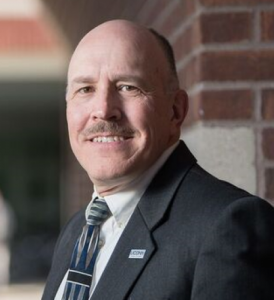
Professor Plesko plays an integral role in shaping policy and guiding future scholars. His extensive service includes leadership roles in major academic and policy organizations. He is a past president of the American Taxation Association, has served on the board of the National Tax Association, and remains an active board member and past president of the American Tax Policy Institute, where he became the first non-attorney to serve in that capacity.
Professor Plesko’s dedication to mentoring the next generation of scholars is also remarkable. He works closely with Ph.D. students and involves them in research with real-world policy applications. His policy work, deeply rooted in his early career at the U.S. Treasury Department during the Tax Reform Act of 1986, has included advising Congress and the IRS. He has testified before the Senate Finance Committee four times, and his research continues to shape national tax policy conversations.
In 2022, he was recognized nationally when he received the Ray M. Sommerfeld Outstanding Tax Educator Award from the American Taxation Association—an honor reserved for educators who have made outstanding contributions across teaching, curriculum development, service, professional engagement, and academic research. This prestigious accolade added to his earlier recognition with the American Accounting Association’s Wildman Medal, making Professor Plesko one of the few scholars honored for outstanding educational contributions and impactful research. The Wildman Medal, awarded for work judged “to make the most significant contribution to the advancement of the practice of public accountancy,” was bestowed upon George and his co-author for a groundbreaking 2003 paper that ultimately led to significant reforms in corporate income tax reporting.
Professor Plesko’s impact is deeply felt at UConn. As Head of the Accounting Department, he has fostered a culture of excellence. His service to the Association to Advance Collegiate Schools of Business (AACSB) as a member and chair of accreditation teams has elevated UConn’s standing and brought valuable insights from leading institutions into UConn’s curriculum, particularly in areas like data analytics. Recognizing his expertise, in 2024, he was appointed to the AACSB’s Accounting Accreditation Committee, which reviews accreditation recommendations.
George Plesko has tirelessly advocated for evidence-based tax policy, is a leader in his field, and an extraordinary educator for over thirty years. His research contributions, the University of Connecticut, and the broader field of taxation make him a most deserving recipient of the Distinguished Faculty Research Award.
Emerging Faculty Research Award: Xiang (Peter) Chen
Xiang (Peter) Chen, an associate professor in the Department of Geography, Sustainability, Community, and Urban Studies, has emerged as one of the most dynamic and impactful early-career researchers at the University of Connecticut. His work is driven by a deep concern for improving the health of vulnerable and underserved populations, particularly low-income communities. Through innovative research that bridges cutting-edge geospatial methods with pressing public health challenges, Professor Chen transforms how we understand and address health disparities in America.
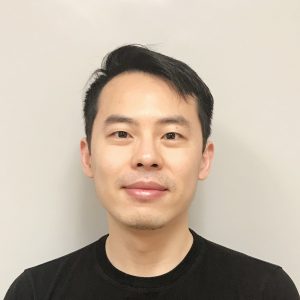
Professor Chen’s research focuses on the commitment to equity, especially food access. His work explores how the built environment, transportation systems, and socioeconomic factors converge to shape dietary health outcomes. Using a powerful toolkit that includes GIS visualization, location-based community surveys, mobility tracking, and advanced spatial modeling, he has drawn national attention to the inequities in food environments across the United States. His publication record is extraordinary for a scholar at this stage in his career, with 64 peer-reviewed journal articles, 38 of them since joining UConn, including many as first author in leading journals across geography and public health.
A landmark example of his work is the development of the Retail Food Activity Index (RFAI), created in collaboration with teams from Emory University, SUNY Albany, and the University of South Carolina. Based on nationwide GPS data, the RFAI quantifies consumer visits to food retailers and highlights visits to stores selling fruits and vegetables, termed “green retailers.” This innovative index outperforms existing measures in predicting cardiometabolic diseases and has opened new doors for reshaping national health policy to serve marginalized communities better. Published in Nature Communications, the study garnered extensive media attention, including coverage in Nature itself, and is already influencing public health dialogue.
Professor Chen’s COVID-19 forecasting research—published in the International Journal of Geographical Information Science—was the first mesoscale COVID-19 model to simulate infections at the town level and aided local health officials in managing the virus spread in Connecticut. This work earned him a prestigious NSF-funded COVID-19 Research Fellowship and national media coverage.
Professor Chen has been a vital contributor to several state and federally funded initiatives, including evaluations of the Connecticut summer meals program, developing a food resource app for Willimantic, and developing Connecticut’s violent mortality dashboard. These projects demonstrate his ability to translate complex spatial data into practical, human-centered solutions. His collaborators span UConn’s Rudd Center, ARMS, El Instituto, Allied Health, and Nutritional Sciences, as well as numerous community partners, showcasing his role as a connector across disciplines and sectors.
Among these community-oriented GIS developments, his work on the USDA-funded “Smart Nutrition” project in Willimantic stands out. Willimantic is one of Connecticut’s most economically disadvantaged communities. Professor Chen led the creation of windham.life, a centralized resource hub offering information on food pantries, grocery stores, bus routes, and other community services. This effort provided community members, particularly those facing financial and transportation barriers to healthy food, with an easy-to-use inquiry tool. More importantly, the project evolved into a pioneering community development model that raised state legislators’ awareness at Connecticut’s state policy conference, helping to guide future planning efforts.
Professor Chen is an exceptional educator and mentor. In addition to mentoring over ten undergraduates through university-funded research programs, he has developed several university-wide mentorship programs to support students’ career development. He directs the Network for Enriched Mentorship, or the NEM, at the Graduate School. The NEM program connects graduate students with faculty or staff mentors outside their home department. These students receive one-on-one mentorship to overcome academic or life obstacles. With over 80 mentors and more than 100 graduate students involved in the current cohort, Professor Chen has built a strong, supportive network to foster student success, resilience, and well-being.
Professor Chen exemplifies the qualities of a rising academic leader in every dimension—research, teaching, community engagement, and interdisciplinary collaboration. His work shapes policy, improves lives, and trains the next generation of scholars to be changemakers.
Faculty Team: Native American and Indigenous Studies
Over the past several years, the Tribal Education Initiative (TEI) has grown from vision to reality, transforming into a dynamic, profoundly collaborative effort to redefine the relationship between the University of Connecticut and the state’s Tribal Nations. At its heart is a remarkable team of Native American and Indigenous Studies (NAIS) faculty— Sandy Grande, Kat Milligan-McClellan, Nate Acebo, Chris Newell, Hana Maruyama, April Anson, Josh Mayer, Bruno Seraphin, and Kali Simmons.
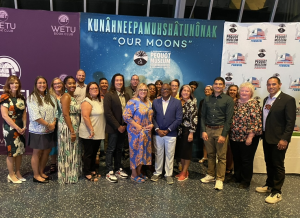
The TEI emerged from student-led efforts encouraging UConn to contend with its history as a land-grant institution and the implications for Indigenous peoples and lands. The founding of the Native American and Indigenous Students Association (NAISA), adoption of UConn’s Land Acknowledgment, and launching LandGrabCT, a research initiative documenting UConn’s history of land appropriation, all helped to pave the way for the hiring of UConn’s first-ever faculty cohort in Native American and Indigenous Studies (NAIS). Upon arrival, faculty advocated for the hire of a Tribal Community Member-in-Residence to deepen the relationship and commitment between the University and Tribal Communities in Connecticut. Chris Newell (Passamaquoddy), a UConn alum and resident of the Mashantucket Pequot Tribal Nation, was subsequently hired into the position, institutionalizing Indigenous leadership at UConn.
Newell was a critical connector between the new efforts emerging through the TEI and existing programs at UConn, namely the Federally Recognized Tribes Extension Program (FRTEP), the foundation for the long-term partnership with the Mashantucket Pequot Tribal Nation and UConn Extension that works to support innovative agriculture, youth development, and Tribal health. This program led to the opening of Meechooôk Farm on Pequot lands and the establishment of the Mashantucket Pequot Tribal Department of Agriculture.
Building upon these efforts, the TEI provides a framework for continuous collaboration and sustained involvement between UConn and Indigenous peoples of the Northeast and beyond. The NAIS faculty leadership in shaping the contours of reciprocal relationships and mapping that onto the institutional framework of the university is a tremendous accomplishment. Faculty have particularly worked to bring greater connection with and awareness of the five Tribal Nations and communities in Connecticut: the Eastern Pequot, Golden Hill Paugussett, the Mashantucket Pequot Tribal Nation, the Mohegan Tribe, and the Schaghticoke. Through innovative programming and institutional advocacy, TEI has ensured that Indigenous knowledge and priorities shape university initiatives. The NAIS faculty in this nomination has made remarkable strides in creating new ways to support the well-being of Indigenous communities. Including IndigiPalooza!, a three-day festival celebrating Indigenous scholarship and creativity, supporting Native students who came to UConn through the New Beginnings grant from the U.S. Department of Agriculture, and hosting a university-wide #IndigiReads event that promotes Indigenous scholarship and the development of several courses in Native American and Indigenous Studies. The NAIS faculty is leading innovation within UConn to prepare for serving the state’s tribal communities with a 21st-century approach to research, scholarship, and teaching.
The TEI represents the culmination of years of intellectual labor, advocacy, and diplomacy, what some might call a once-in-a-generation effort. But its power lies in the people behind it. This is not some speculative plan—it is the product of hundreds of hours of policy-building, community engagement, cross-government collaboration, and unwavering belief in the power of education to serve the public good. The TEI is about more than programs or policies. It’s about reimagining education’s future in a just, inclusive, and transformational way. The NAIS faculty doesn’t just talk about justice, they live it. They are reshaping curriculum, university culture, and institutional values in ways that ripple across Connecticut and beyond. They have created something profound, enduring, and essential. And they’ve done it with humility, brilliance, and a shared purpose.
Institutional Transformation Award: Orthopedic Surgery
In the heart of UConn Health’s Department of Orthopedic Surgery, a quiet but powerful transformation has unfolded—one fueled by mentorship, purpose, and a deep commitment to inclusivity. Dr. Kathy Coyner, Dr. Lauren Geaney, and Dr. Olga Solovyova, esteemed associate and assistant professors, have emerged as champions of institutional change, redefining what it means to lead in academic medicine. Their efforts represent the gold standard of community-engaged scholarship. Through innovative programs, strategic collaboration, and relentless dedication, these leaders have worked to close gender gaps in surgical specialties and create new pathways for the next generation of women in medicine and engineering.
The foundation of this transformation began with a troubling observation: despite women making up the majority of UConn School of Medicine’s Class of 2019, they remained vastly underrepresented in surgical specialties. Nationally, the statistics were just as stark; surgery, especially in orthopedics, remained dominated by men. In response, Dr. Coyner, with the support of Dr. Geaney and Dr. Solovyova, launched “I Look Like A Surgeon Too” (ILLAST), a groundbreaking initiative designed to challenge stereotypes, foster mentorship, and provide hands-on surgical experiences to female medical students. Through practical workshops, shadowing opportunities, and honest conversations with women surgeons, ILLAST offered something many students had never seen for themselves, reflected in a future career in surgery.
In just a few years, ILLAST garnered national attention, earning the 2023 Kaiser-Permanente Award, and inspired a visible cultural shift at UConn Health and beyond. But Dr. Coyner, Dr. Geaney, and Dr. Solovyova didn’t stop there. Understanding that true transformation requires a broad, inclusive approach, the team expanded ILLAST’s reach by partnering with departments across surgical disciplines—general surgery, urology, OB/GYN, otolaryngology, and more. They created an interdisciplinary network of mentorship and support, giving students a panoramic view of what a future in surgery could look like.
They also looked earlier in the pipeline, launching the Inspiring Women in Engineering & Medicine (IWEM) program, which connects high school girls and non-binary students with real-world experiences in medicine and engineering. Hosted at the UConn Musculoskeletal Institute, IWEM introduces students to surgical tools, techniques, and the professionals behind them. Over 600 students have participated—entirely free of cost, many of whom leave with a renewed belief in what’s possible. After meeting female surgeons during a workshop, one student said, “I now believe I can be just as successful in something that society may not have necessarily told me I can.”
A shared ethos is at the heart of ILLAST and IWEM: fundamental transformation happens when people feel seen, supported, and heard. That’s why Drs. Coyner, Geaney, and Solovyova have made candid conversation and honest mentorship a pillar of their work. From discussing the intricacies of surgical skills to addressing life as a woman in a demanding field—parenthood, partnership, burnout, and bias—these mentors create safe, empowering spaces where futures are imagined and built. Now woven across departments and educational levels, this support network is reshaping UConn’s institutional culture. Their leadership has sparked a ripple effect, influencing students, peers, faculty, and administrators, who now see gender equity and inclusive mentorship as central to UConn Health’s mission.
Dr. Coyner, Dr. Geaney, and Dr. Solovyova’s impact is visible in statistics and the lived experiences of those they’ve reached. Their efforts have expanded the diversity pipeline, shifted cultural expectations, and positioned UConn Health as a national leader in fostering gender equity in surgical education. In their incoming intern class, they have already matched three women out of five total residents. Since Dr. Coyner started this initiative, the number of women in the orthopedic residency program has increased from 7% to 30%, highlighting the impact of these initiatives.
By integrating mentorship, community engagement, and institutional leadership into every facet of their work, they have modeled the essence of transformation—strategic, heartfelt, and lasting. These programs’ legacies continue to grow with an ongoing focus on outreach, collaboration, and recruitment. Drs. Coyner, Geaney, and Solovyova remain steadfast in their mission: to inspire and support women at every stage of their journey, from high school classrooms to surgical suites.
Their collective work is a powerful reminder that institutions are transformed by policies and people willing to reimagine what’s possible and build them with purpose. Recognizing Dr. Coyner, Dr. Geaney, and Dr. Solovyova with the Institutional Transformation Award is more than a celebration of their remarkable achievements; it is a reaffirmation of UConn’s highest ideals—excellence, equity, and community-driven change.
Distinguished Staff Award: Milagros Marrero-Johnson
Milagros Marrero-Johnson, Senior Director of Strategic Initiatives and Community Engagement at the School of Social Work, has been a steady force of innovation, compassion, and leadership for over two decades. Marrero-Johnson’s journey at UConn began as Director of Student Services and has evolved over the years to encompass a dynamic portfolio of leadership roles. She has remained deeply rooted in academic and community spheres, nurturing strategic relationships that have expanded the School of Social Work’s mission beyond campus boundaries. Her ability to forge authentic partnerships across Hartford and the state has raised UConn’s public profile and created an enduring bridge between academia and the community.
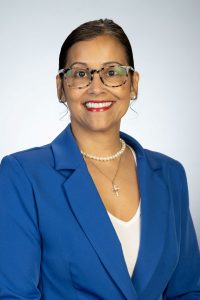
As Co-Investigator and Operational Project Director on a $3.1 million U.S. Department of Education grant, she has led efforts to train graduate interns in school social work, focusing on child and youth behavioral health. Under her guidance, partnerships were secured with several school districts—Hartford, New Britain, Vernon, and Waterbury—ensuring that students gain experience and contribute directly to the well-being of local children and families.
She also co-leads a high-impact advisory board comprising state-leading organizations such as the Department of Children and Families, The Village for Families and Children, Wheeler Clinic, and the Child Health and Development Institute. These partners shape curriculum, provide speakers, and connect students to post-graduate employment opportunities, ensuring that training is grounded in the real-world needs of Connecticut communities.
Another of Marrero-Johnson’s groundbreaking contributions is CT Adelante!, a bilingual Master of Social Work program funded by the $2 million CT Health Horizons initiative. Designed for Spanish-speaking students, this program strengthens their professional language skills and prepares them to serve Spanish-speaking children and adolescents with cultural and linguistic competence. Marrero-Johnson has cultivated a pipeline of culturally competent, community-focused professionals through her vision and leadership. Her long-standing partnership with the Connecticut Department of Children and Families (through the Academy for Workforce Training Academy) has helped DCF employee and non-employee graduate students with specialized training. She expanded this work to include undergraduate students, especially those fluent in Spanish, building a responsive and diverse public child welfare workforce. One of her more recent efforts—launching a new partnership with the Connecticut Children’s Alliance to support stipend placements in child abuse prevention settings—underscores her continued innovation and forward thinking. This program, set to begin in Fall 2025, will further expand the reach of UConn’s social work students into critical areas of need.
Marrero-Johnson shared her work at national conferences, including those hosted by the National Association of Social Workers and the Latinx Social Work Organization. She has co-authored a peer-reviewed article on bilingual social work education using a distributive justice framework. Her voice is one of experience and authenticity, grounded in real-world application and driven by a passion for equity. Ms. Marrero-Johnson is a mentor, a cheerleader, and an architect of the community. The students consistently credit her guidance as instrumental in their personal and professional growth. She has an unmatched ability to create a sense of belonging within the School of Social Work and beyond. Her work is rooted in a deep belief that community begins in the classroom—that when students feel seen and supported, they are better equipped to serve others with empathy, integrity, and commitment.
Ms. Milagros Marrero-Johnson has demonstrated extraordinary dedication to community, equity, and education. Her legacy is written in the lives of the students she mentors, the communities she uplifts, and the systems she helps transform. Her work exemplifies the best of the University’s mission to serve, lead, and empower.
Emerging Staff Award: Tanya Johnson
Tanya Johnson, Research and Instructional Services Librarian at the School of Law, works at the intersection of law, community engagement, and educational innovation. Through visionary leadership and an unwavering commitment to equity, Tanya has worked to expand access to justice in housing and reimagine legal education at UConn Law, positively impacting the lives of Connecticut residents and advancing a more inclusive and responsive legal system.
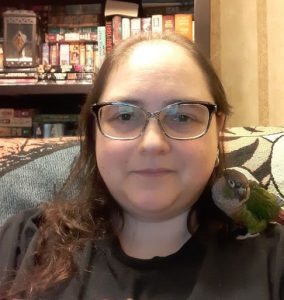
Her groundbreaking work is the UConn Law Library Fair Rent Commission Project, which she envisioned and leads. Tanya identified a significant challenge in response to a 2022 Connecticut law mandating municipalities to create Fair Rent Commissions (FRCs) to address tenant complaints about excessive rent increases: the lack of public access to FRC documentation and decisions. These materials were inconsistent or unavailable, creating barriers for tenants, attorneys, and advocates navigating the FRC process. Tanya’s project directly addresses this gap, improving transparency and empowering communities.
Tanya launched a statewide effort to collect, catalog, and centralize FRC documentation to meet this challenge. Her work has created a publicly accessible repository within the Connecticut Digital Archive (CTDA), an invaluable resource offering access to meeting agendas, ordinances, and commission decisions across the state. Complementing this archive, she is developing a comprehensive research guide and a detailed index of decisions, allowing users to evaluate trends, understand how municipalities interpret the law, and better prepare for hearings.
The impact of the FRC Project is already evident. Advocates and researchers use the resources to inform policy, shape legal strategies, and support community members navigating rental disputes. By improving transparency and accessibility, Tanya’s work fosters greater equity and stability in Connecticut’s rental housing system. Her outreach, such as her presentation at the CTDA’s 2024 meeting and upcoming events, continues to grow public awareness of this critical tool, empowering residents with the knowledge needed to advocate for fair treatment. Tanya’s commitment to justice extends into the classroom. She has worked to enhance legal education at UConn Law by incorporating active learning and gamification techniques, particularly in her legal research classes. Her innovative approach has helped improve student engagement and learning outcomes, equipping future lawyers with vital skills through dynamic, interactive methods. Tanya is currently co-authoring a book on games in legal education, aiming to explore how these techniques can make complex legal concepts more accessible, inclusive, and impactful for diverse learners.
Tanya Johnson has tirelessly advocated for diversity, equity, inclusion, accessibility, and justice (DEIAJ) at UConn Law. She helped create the DEIAJ Collection at the Law Library, offering resources that critically explore identity, systemic oppression, and equity within the legal field. Her service with the Student Diversity Alliance and the Diversity, Equity, and Belonging Committee has contributed to a more welcoming environment for students, staff, and faculty. One of her most powerful contributions to these efforts was her 2023 article, “An Autoethnographic Exploration of Fatness in Law Librarianship,” which sparked meaningful conversations about representation, identity, and inclusion in the legal and academic communities. Tanya’s work in this space continues to challenge norms and expand the understanding of what justice and equity can look like in higher education.
Through courses such as “Diversity & Inclusion in the Legal Profession” and “Research for Social Justice,” Tanya empowers students to examine their role in shaping a more just legal system. These courses prepare students to succeed academically and inspire them to carry forward the values of justice, critical inquiry, and community responsibility in their careers. Her work ensures that legal education at UConn is rigorous and responsive to the real-world issues that students—and their future clients—will face.
Tanya Johnson’s work is a testament to the transformative power of community-engaged scholarship. Whether addressing housing inequity through groundbreaking digital archiving, innovating the legal curriculum, or leading efforts in diversity and inclusion, Tanya brings thoughtfulness, initiative, and deep care to everything she does. She is not only emerging as a leader within UConn Law—she is becoming a model for what impactful, equity-driven university staff leadership can and should look like.
Staff Team Award: UConn Husky Nutrition & Sport
The UConn Husky Nutrition & Sport (UConn HNS) team has been one of the University’s most enduring and impactful community-campus partnerships for over two decades. Under the leadership of Professor Jennifer McGarry in the Neag School of Education, this team of dedicated staff, postdoctoral scholars, and student leaders has built and sustained meaningful relationships across Connecticut, especially in the North End of Hartford. The team includes: Patricia Bellamy-Mathis – Director of Partners & Programs, Catalina Quesada – Community Education Specialist, Brandon Keaton, Educational Program Coordinator, Veronica Jacobs, Educational Program Administrator, Sarah Larocque, Educational Program Coordinator, Roc Rochon – Postdoctoral Scholar, Courses & Student Supports, Julián Alonso – Postdoctoral Scholar, Elementary School Partnerships, Joseph Condren – Communications & Impact Specialist, Joanee Mata – Assessment & Student Support Coordinator, and Madison González – Student Leadership & Program Specialist.
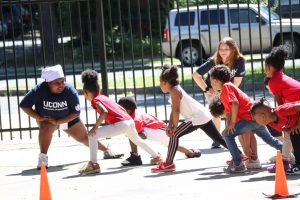
These professionals collaboratively lead efforts that span early childhood education, family wellness, adult health literacy, and intergenerational health promotion. UConn HNS is a model for engaged scholarship and collaborative, equity-focused public health education. UConn HNS staff cultivate long-term, reciprocal partnerships with community members and organizations, treating every collaborator as an equal authority on their needs and experiences. These “right relationships” actively challenge inequitable social structures and behaviors. The team designs programs directly responding to community needs, aligning with SNAP-Ed guidance to support nutrition and physical activity education across all ages. With a staff and student base that reflects the diverse communities it serves, UConn HNS creates inclusive, culturally aware programming. Its work exemplifies equity-focused practice in action. Since its inception as two separate SNAP-Ed initiatives—Husky Sport (Neag School of Education) and Husky Nutrition (UConn Health)—the organization has expanded its reach and merged into a cohesive, collaborative entity. Today, thanks to a $4.2 million USDA funding allocation, UConn HNS operates through five functional teams (People, Partners, Impact, Communications, and Operations), each interwoven with staff leadership and student participation.
For the last four years, UConn HNS average annual engagement has facilitated over 1,400 educational sessions reaching 3,300+ participants, including: 450+ Husky Reads lessons across 45 pre-K classrooms, 50+ Husky Nutrition Workshops tailored for adults and families, delivered in English and Spanish, 80+ after-school and weekend enrichment programs, and 800+ educational sessions as part of the Husky Sport @ Wish School partnership in Hartford. These numbers result from deep, sustained relationships and co-created programming built in collaboration with schools, libraries, senior centers, grocery stores, and neighborhood organizations.
What UConn HNS does for Connecticut communities and what it means for UConn students makes it unique. UConn HNS offers a comprehensive, experiential learning ecosystem to over 125 students annually. UConn HNS integrates students into its work through Service-learning courses (1–4 credits) cross-listed with educational leadership and nutritional sciences, writing-intensive, and critical reflection-based courses designed to cultivate civic responsibility, and paid internships and graduate assistantships offering skill development in curriculum design, research, evaluation, digital media, operations, and community engagement. Many of these students return year after year, continuing through graduate school, often supported by HNS staff mentorship. Over 80 graduate students, across fields such as Public Health, Social Work, Sport Management, and Education, have completed degrees while working with UConn HNS.
Across every dimension—community partnership, student development, public health promotion—the UConn HNS staff team is a paragon of equity-centered, community-engaged scholarship. Their work directly supports the University’s newly adopted Strategic Plan, particularly the goal of providing life-transforming educational experiences and strengthening community impact. Through their leadership, expertise, and commitment, they continue strengthening the ties between the University and the people it serves, creating healthier, more just communities and empowering the next generation of public health and education leaders.
Professional Student Award: Kamal Gautam
Kamal Gautam, Ph.D. candidate in the Health Promotion Sciences Program, has proven to be an indispensable member of the research lab team, contributing extensively to both domestic and international research initiatives focused on HIV prevention among men who have sex with men, transgender women, and people who inject drugs. As a Graduate Research Assistant, Kamal has played a central role in coordinating multiple NIH-funded projects in the U.S., Nepal, and Malaysia, balancing many responsibilities with remarkable poise and effectiveness.
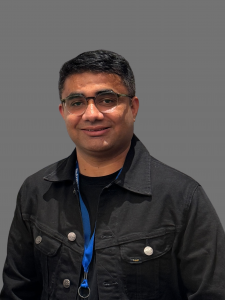
Kamal brings a robust background in public health and a deep commitment to working with marginalized populations. His field experience with various national and international organizations informs his belief in community-centered research, which places community members, research participants, and grassroots partners at the heart of every phase, from research design to evidence generation and the development of tailored behavioral interventions. His approach has fostered inclusive, meaningful, and impactful research.
Despite being in the early stages of his research career, Kamal has already developed and demonstrated a comprehensive and mature skill set. He excels in project management, statistical analysis, manuscript writing, participatory research design, and leadership. He currently leads multiple NIH-funded projects addressing critical public health issues, from mobile health (mHealth) interventions for HIV prevention among Malaysian transgender women and men who have sex with men to studying the feasibility of PrEP among opioid-dependent individuals in the U.S. and exploring mental health and HIV risks in Nepal.
Kamal’s academic output has been nothing short of outstanding. Since joining the lab in Fall 2022, he has first-authored six published manuscripts, submitted two more, and is preparing five additional papers. His collaborative spirit has led to the co-authorship of 23 manuscripts alongside over 20 experts and community partners, focusing on HIV/AIDS prevention and comorbidities such as mental health. His work has earned him a full scholarship to present two posters at the International AIDS Conference in Munich, Germany, and he recently presented one oral and three poster presentations at the Society of Behavioral Medicine’s 46th Annual Meeting & Scientific Sessions in San Francisco.
One of Kamal’s most notable accomplishments is his leadership in organizing a large-scale research dissemination event in Nepal. This gathering brought together LGBTIQ+ community members, government officials, and representatives from national and international organizations to share critical findings related to HIV, mental health, and suicide prevention. The event enhanced the visibility and applicability of our research and cultivated strong ties among key stakeholders, paving the way for future policy and programmatic interventions.
Beyond his research accomplishments, Kamal has consistently demonstrated an unwavering commitment to mentoring and team development. He currently mentors eight undergraduate students and six field-based research assistants, playing a vital role in creating a supportive and collaborative learning environment. His technical skills are matched by his positive attitude, eagerness to learn, and sincere passion for working with underserved communities.
Kamal’s excellence and dedication extend into participatory research methodologies. In Fall 2023, he was awarded UConn El Instituto’s Pre-Doctoral Award for conducting participatory research using photovoice methods focused on the mental health of young Latino students. This project exemplifies his commitment to amplifying the voices of often overlooked communities. Kamal’s coordination of complex, multi-country research initiatives, especially those involving marginalized populations, has significantly enhanced the scope and impact of the department’s work. His leadership in capacity building, from training research assistants to co-authoring papers with field staff, has deepened community trust and strengthened the sustainability of the Health Promotion Sciences program. Kamal Gautam is an outstanding scholar, gifted leader, and passionate advocate for equity in health research.
Undergraduate Student Award: Sydney Seldon
Sydney Seldon’25 (CAHNR), whose leadership, compassion, and unwavering dedication to community engagement have left an indelible mark on the University of Connecticut and the broader local community. Sydney is known for building community wherever she goes. One of her most remarkable contributions has been the revival and reinvention of the Give & Go Program—a student-led sustainability and donation initiative that has been dormant since 2019.
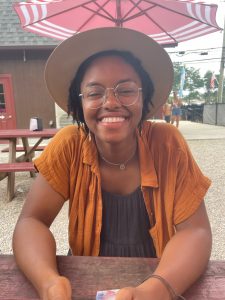
In the fall of 2023, Sydney approached the Office of Community Outreach with a clear vision and a compelling question: “Can we bring Give & Go back?” Having already established strong relationships with the Office of Sustainability, where she interned since her freshman year, as well as establishing relationships with several other community organizations, Sydney took the lead in resurrecting this vital program that diverts student move-out waste from landfills and channels it into the hands of local nonprofits serving those in need. Her motivation wasn’t just environmental; it was social, personal, and deeply grounded in a desire to do good for the Earth and its people.
Reviving a program of this scale wasn’t easy. It had been inactive since the onset of the COVID-19 pandemic, and many of the campus partnerships that had once supported it had faded. Undeterred, Sydney dove in. She reestablished connections with key university departments, including Residential Life, Facilities, and the College of Agriculture, Health, and Natural Resources. She recruited and trained volunteers, navigated logistical challenges, and coordinated donation efforts across campus while balancing her academic responsibilities and final exams.
In May 2024, thanks to Sydney’s incredible effort, over 8,000 pounds of donations—including furniture, clothing, nonperishable food, appliances, and bicycles—were collected, sorted, and distributed to eight local nonprofits, including Windham Interfaith Ministries, Willow House, and Journey Home. These organizations serve a diverse range of vulnerable populations, including unhoused individuals, families struggling to make ends meet, and children with disabilities. Sydney’s thoughtful planning ensured that every item was sorted according to the specific needs of each partner, maximizing the impact of every single donation.
Yet Sydney’s vision didn’t end with the spring collection. Even as the last items were cleared from Ratcliffe Hicks Arena, she had already begun planning for Give & Go 2025, laying the foundation for a more robust, self-sustaining program. She has continued strengthening on-campus partnerships, expanding community collaborations, and increasing volunteer engagement. What’s more, she is currently exploring an innovative new idea: a free store on campus that would make essential items—clothing, bedding, school supplies, and more—available to students in need year-round. Though still in development, this concept speaks volumes about Sydney’s ability to think creatively and compassionately about lasting solutions to everyday challenges.
Sydney’s drive comes from a deep-rooted desire to make meaningful changes and empower others to join her. Her motivation wasn’t just environmental; it was social, spiritual, and deeply grounded in a desire to bring joy and hope to surrounding communities. She’s found that the program has profoundly transformed her and allows her to live out her desire and invite others to be transformed.
As a student leader within Community Outreach, she models reciprocity, respect, and collaboration. She lifts others as she leads and continues to inspire everyone fortunate enough to work alongside her. Her leadership in reviving the Give & Go Program and expanding its vision for the future embodies the very essence of community-engaged scholarship and service. Recognizing her contributions is acknowledging her impact and celebrating what is possible when passion meets purpose.
Student Team Award: Aviral Mehta; Pratham Tallam; Faizdeenkhan Pathan
Aviral Mehta ’25 (CLAS), Pratham Tallam ’25 (CLAS), and Faizdeenkhan Pathan ’25 (CLAS) have emerged as transformative leaders in student mental health at the University of Connecticut. Through their United Mind Project initiative, this exceptional team has demonstrated a rare combination of innovation, compassion, and cultural insight, driving lasting, tangible impact within the UConn community and beyond. Their work addresses students’ urgent mental health needs through an inclusive, research-informed, and culturally attuned framework.
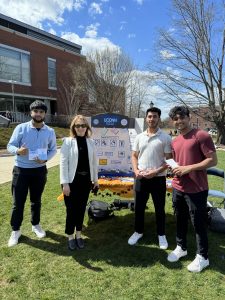
Their journey began in October 2023 with a clear-eyed focus on a nuanced issue: the mental health challenges uniquely affecting Asian students. Recognizing the powerful intersection of cultural stigma, academic pressure, and intergenerational expectations, they proposed a holistic solution grounded in empathy and action. From that initial outreach, the United Mind Project quickly evolved into a multifaceted and sustainable initiative to dismantle barriers to mental health support and promote well-being across diverse student populations.
At the heart of their success lies a deeply strategic and innovative three-pronged approach—engaging students, families, and faculty in an ongoing dialogue around mental health. Through this model, the team has created spaces where vulnerability and validation coexist, and support replaces stigma. They’ve launched educational workshops with mental health professionals, led awareness campaigns, and developed accessible resources, ensuring their work is rooted in cultural sensitivity and community voice.
Among their standout achievements is the development of a student-created mental health module for SOLID training, which has reached over 2,400 student leaders across campus. This powerful contribution reflects their dedication to education and outreach and reinforces their belief that mental health awareness should be woven into student leadership and campus life. Their impact extends well beyond the borders of UConn. In collaboration with a local school district responding to a tragic loss, they provided expert insight and developed new mental health training for student leaders. They presented their work at the district’s administrators’ kickoff meeting and helped to shape support structures for youth mental health in K–12 settings. Their influence is measurable, far-reaching, and deeply personal for the communities they serve.
On the academic front, their partnership with UConn faculty has led to groundbreaking research on intergenerational mental health perceptions, culminating in a presentation at the Connecticut Psychological Association’s Annual Conference. In addition, their collaboration with the UConn Family Portal helped launch UConn’s first-ever Family Portal in partnership with Dr. Fany Hannon (Dean of Students) and John Armstrong (Associate Dean of Students). This platform now reaches over 37,000 UConn parents and families, providing a centralized space for timely and supportive communication. Since its launch, this team of students has been developing infographics, resource guides, and tools to help families better support their students, covering topics like navigating academic deadlines, managing stress, and adjusting to campus life. They do this because it is an integral part of their mission to bridge conversations about student well-being beyond the campus community.
Overall, their data-driven work has informed new strategies within the university, underscoring their ability to translate research into real-world action. From developing a chatbot to improve access to mental health resources to thoughtfully integrating family and faculty into mental wellness conversations, the team has proven to be a force for positive change. Their projects are innovative, sustainable, scalable, and built to endure. They have created a model of student-led advocacy that bridges gaps between research, practice, and cultural experience.
Their contributions have also been amplified through the Holistic Huskies Podcast, where their voices reached a broader audience to discuss topics such as cultural stigma, family dynamics, and the urgent need for inclusive mental health support. Their authenticity, vulnerability, and evidence-based insights made a powerful impression on listeners, validating countless students who may have felt unseen or unheard in their mental health journeys.
What sets Aviral, Pratham, and Faizdeenkhan apart is their ability to lead and how they lead. They listen, collaborate, and act with a purpose deeply rooted in empathy and justice. They’ve made it their mission not just to pull students out of the river but—as Desmond Tutu wisely said—to go upstream and understand why they’re falling in.
All biographies were prepared using details submitted in the nominee’s application.
